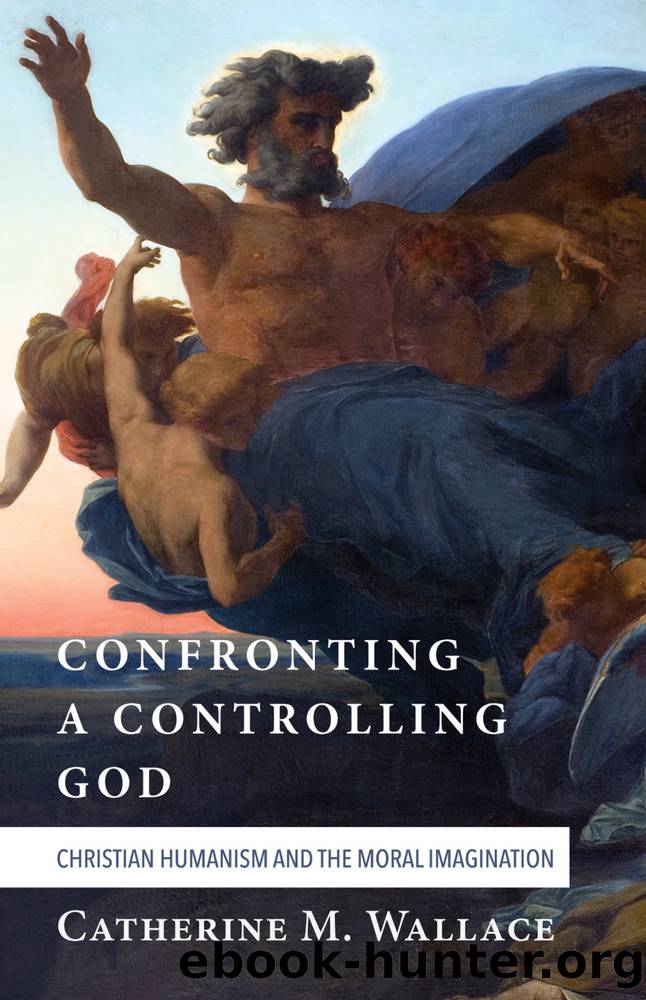Confronting a Controlling God by Wallace Catherine M.;

Author:Wallace, Catherine M.; [Wallace, Catherine M.]
Language: eng
Format: epub
ISBN: 9781498228947
Publisher: Wipf and Stock Publishers
Published: 2016-08-24T07:00:00+00:00
7
Poets as Theologians: The Moral Imagination of Christian Humanist Tradition
Thereâs an obvious argument against the possibility that God is personally present to us. In its simplest form, it goes like this: there are seven billion people on earth, which is one insignificant planet among an uncountable multitude of planets where life might exist. Over thousands of years in which our species has existed, countless more of us have been born and died. Have each of these individuals been individually known and loved? To many good and morally sensitive people, the idea borders upon lunacy. If itâs not frankly delusional, it is so terribly naive that no intelligent person would consider the claim for an instant.
I have despaired at timesâI have despaired repeatedlyâthat few of my fellow Christians seem to understand the solid grounds for this disparaging incredulity. Their personal relationship with God is so central to their identity, and they are so deeply embedded socially in a community where the reality of a personal God is everywhere assumed, that they cannot fathom how ridiculous their beliefs look to nonbelievers.
The problem, of course, is many peopleâbelievers and nonbelievers alikeâfail to understand that the statements âGod is a personâ or âwe have a personal relationship with Godâ are both symbolic claims. Such claims are an effort to illuminate something we cannot otherwise apprehend by something we can. Talk about the âpersonhoodâ of God are an effort to flash some light onto what is otherwise a stunningly inexplicable experience.
Are we nuts? Should we call a psychiatrist? Should we shrug and write off such experiences as transparently meaningless? These are honest questions. For thousands of years, spiritual masters have honestly engaged these skeptical challenges. At the same time that the tradition encourages believers to recognize the personal presence of God, it has always surrounded that teaching with sophisticated cautions and safeguards against what today we would call projection or unconscious contents or self-deception or narcissistic self-absorption. Evelyn Underhillâs great compendium Mysticism (1911) is replete with stern cautions and probing doubts. The primary safeguard, theologically speaking, is that no one sees God face-to-face. The human experience of God is inevitably partial. God is revealed to us only incompletelyâand as that which eludes definition.
Without such safeguards, mixing biblical literalism with the spiritual teaching the God is personally present to us yields an explosively dangerous mixture. Early in the twentieth century, the Christian âFundamentalistâ movement, with its active hostility both to scholarship and to cultural criticism, invited a genuinely dangerous projection of âdivine authorityâ onto its own hostile ethnocentricity and its own unconsciously mechanistic theology of Jesusâ rescuing us from an angry, vindictive God. But such misrepresentations of Christian spirituality do not discredit the real thing, just as creationist museums do not discredit evolutionary biology.
As anthropologist T. H. Luhrman has documented both in the New York Times and in her book When God Talks Back (2012), there are corners of Christian tradition today that completely disregard thousands of years of theological safeguards against the temptation to project unconscious content onto God.
Download
This site does not store any files on its server. We only index and link to content provided by other sites. Please contact the content providers to delete copyright contents if any and email us, we'll remove relevant links or contents immediately.
Fangirl by Rainbow Rowell(8807)
How to Bang a Billionaire by Alexis Hall(7941)
Wonder by R. J. Palacio(7749)
The Space Between by Michelle L. Teichman(6588)
The Thirst by Nesbo Jo(6452)
Assassin’s Fate by Robin Hobb(5867)
Wiseguy by Nicholas Pileggi(5333)
The Night Circus by Erin Morgenstern(5042)
The Kite Runner by Khaled Hosseini(4962)
Paper Towns by Green John(4811)
Bittersweet (True North #1) by Sarina Bowen(4719)
Gerald's Game by Stephen King(4386)
Too Much and Not the Mood by Durga Chew-Bose(4105)
Pillow Thoughts by Courtney Peppernell(4033)
Goodbye Paradise(3463)
Twelve Days of Christmas by Debbie Macomber(3421)
Good by S. Walden(3361)
The Rosie Effect by Graeme Simsion(3223)
The Cellar by Natasha Preston(3080)
